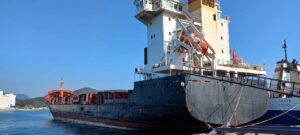
In 2024, the vessel will be involved in coastal cargo transportation, including to ensure northern delivery
FESCO Transport Group has accepted an ice-class container ship named “Captain Byankin” into the fleet. The vessel, built in 2007, has a length of 129.62 m, a width of 20.6 m, a deadweight of almost 8,150 tons, a cargo capacity of 698 TEU. The crew consists of 14 people. With the adoption of this container ship, the fleet managed by the group reached 35 vessels, the press service of FESCO reports.
Until the end of 2023, Kapitan Byankin will operate on foreign trade services between the Russian Far East and the ports of the Asia-Pacific region (APR), in 2024 it will be used on coastal services, including to ensure northern delivery.
The vessel is named in honor of the long-distance sailing captain, head of the Far Eastern Shipping Company (Far Eastern Shipping Company), Candidate of Geographical Sciences, researcher of navigation in Russia Valentin Byankin. He headed the DVMP from 1969 to 1977, and was one of the first to pay special attention to the development of linear shipping and containerization in Russia. Under him, the FESCO foreign trade lines were launched — Indian Line, Australian Line, Pasific, and the first specialized vessels for container transportation were purchased.
FESCO Transport Group is one of the largest transport and logistics companies in Russia with assets in the field of port, railway and integrated logistics business. The Group owns Vladivostok Commercial Sea Port, intermodal operator FESCO Integrated Transport, operator of refrigerated containers Dalreftrans, Transgarant and FESCO Trans companies. The Group operates terminal complexes in Novosibirsk, Khabarovsk, Tomsk and Vladivostok. The container fleet is more than 170 thousand TEU, the number of fitting platforms exceeds 11 thousand units. The fleet includes more than 30 transport vessels under management, which carry out transportation mainly on their own sea lines.
Original article: https://portnews.ru/news/355102/